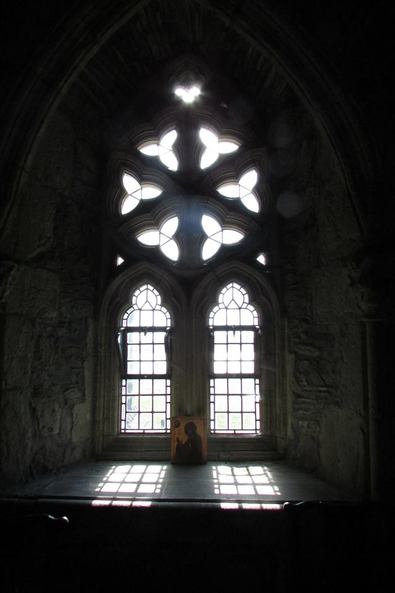Stability

In one of the monasteries I visited, after evening prayer one of the monks met the guests outside the chapel and mentioned to us that one of the guests was singing very loudly and throwing the monks' singing off. He was nice about it, but he asked us to do our best to listen and blend in with the monks' singing. Then he said, "Some of these monks have sung together for more than 50 years, and they've developed a certain way of singing."
In every monastery I visited I noticed there were old monks who'd been in that monastery a very long time. They deal with the same problems any of us have when human beings are together, the frustrations and challenges people have when they share the same space, but they were still there, day after day, singing the psalms together as they've done for decades. One monk said joining a monastery is like being married to dozens of crazy uncles, but yet they stick it out, being a community together even when it's hard.
In Chapter one of The Rule of St. Benedict, Benedict list four types of monks, two he liked and two he didn't. The ones he liked, the cenobites and anchorites (or hermits) were monks who lived in a monastery under a rule or monks who lived in solitude. The monks he didn't like were the sarabaites, monks who live by no rule except whatever they feel like, and gyrovagues, monks who bounce around from monastery to monastery, never settling in one place. This is how he describes them: "Always on the move, they never settle down, and are slaves to their own wills and gross appetites. In every way they are worse than the sarabaites." For Benedict stability in one place by a rule was central to growth in faith. One couldn't jump from place to place; there needed to be stability.
I've lived in five different states, so I'm no expert on this. I know the lure of the next place, hoping the next destination will be the perfect place we all hope is out there. We've all probably encountered someone who keeps seeking the perfect relationship, hoping the next one will be the one. I've seen, too, the person who jumps from church to church every couple of years, hoping they'll escape whatever problems he or she encountered in the last one. Stability, though, tells us that we don't need to seek the next thing; where we are right now is enough. Stability says God is enough in this moment; I don't need the next place, the next thing, the next person to cure me. Jonathan Wilson-Hartgrove says, in his excellent book The Wisdom of Stability (really, go and buy it and read it today), "Stability is a commitment to trust God not in an ideal world, but in the battered and bruised world we know."
I'm a fan of smaller churches because stability is lived in these communities of faith. I noticed in some of the churches I've visited this summer there were people who'd been at these churches a very long time. In smaller churches, too, you can't hide from the person you dislike. Your brother or sister in faith who rubs you the wrong way is right there, down the pew from you, and there's no hiding. It's easier to be in an anonymous place or just to hope the next place will be the perfect place, with no one there to bother us ( and good luck with that). I've seen so many who live stability in these smaller churches, knowing that hiding or running from what troubles them won't make anything better. They're there, week after week, living stability.
I know there are situations where leaving is the best thing. There are abusive situations where finding the door is the best cure; there are broken situations where people are just better off being away from one another. I've shaken the dust from my feet, as Jesus advised, in leaving a few situations and moving on. But especially in our transitory world we live in Benedict needs to be heard, inviting us not to move on, but to know God right in the imperfect place we're in.
"In drawing up its regulations, we hope to set down nothing harsh, nothing burdensome." - Rule of St. Benedict